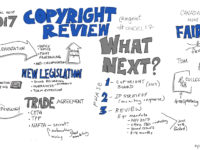The continuing consumer group boycott of the CRTC’s Internet code proceeding was raised directly with Prime Minister Justin Trudeau during Question Period in the House of Commons yesterday. NDP MP Brian Masse noted “the CRTC says it wants to establish a consumer Internet code of conduct, but has failed to provide sufficient time for consumer groups and the public. The result is a boycotted and broken system.” Trudeau’s responded that the government was proud of working with the CRTC and included a parting shot at the NDP, commenting on its support of a taxes on Internet usage. Regardless of the NDP position on an Internet tax (Masse says he opposes one), what is notable is that it is the CRTC that has emerged as a vocal supporter of an ISP tax. CRTC Chair Ian Scott’s decision to back an ISP tax as part of a larger scheme to regulate Internet-based services not only runs counter to Trudeau’s opposition to an Internet tax but it also points to a regulator that is increasingly anti-consumer in approach.
News
In Support of Evidence-Based Copyright Reform: My Industry Committee Copyright Review Submission
Earlier this week, I submitted my copyright review brief to the Industry Committee. The brief tracks my opening comments to the committee closely, focusing on the data arising from five issues: educational copying, site blocking, the so-called value gap, the impact of the copyright provisions of the CUSMA, and potential reforms in support of Canada’s innovation strategy. Due to a 2,000 word limit, the committee version will be a slightly condensed version of my original. I’ve posted both online (original version, submitted version).
The State of Canadian Copyright: My Copyright Review Appearance Before the Industry Committee
With the Industry committee’s copyright review winding down, I appeared yesterday before the committee to discuss the state of Canadian copyright. The wide ranging two hour discussion focused on everything from fair dealing to crown copyright to concerns that publishers don’t fairly compensate authors for their digital licensing revenues. My opening statement placed the spotlight on five issues: educational copying, site blocking, the so-called value gap, the impact of the copyright provisions of the CUSMA, and potential reforms in support of Canada’s innovation strategy. An audio version and transcript of the opening statement is posted below.
“Why Are You Recommending Notice and Takedown?”: The Canadian Bar Association’s Puzzling Position at the Copyright Review
The Canadian Bar Association appeared before the Standing Committee on Industry, Science and Technology earlier this week as part of the nearly-concluded copyright review. The CBA submitted an odd brief that focused on a mix of issues, including anti-counterfeiting, notice-and-notice, and artists’ resale rights. The notice-and-notice comments captured the attention of at least one MP, who was left puzzled by the position.
Boycott: What If The CRTC Launched a Consumer Internet Code and Consumer Groups Refused to Participate in its Development?
Last month, the CRTC announced plans to create an Internet Code of Conduct. The CRTC promised that the code would establish “consumer friendly business practices, provide consumers with easy-to-understand contracts, ensure consumers have tools to avoid bill shock, and make it easier for consumers to switch providers.” The code attracted some initial criticism due to the wide range of exclusions – everything from net neutrality to privacy to broadband speeds falls outside its scope – but in recent days an even bigger concern has emerged with several leading Canadian consumer groups actively boycotting the proceeding.











